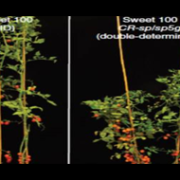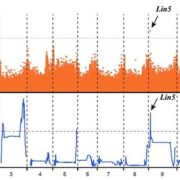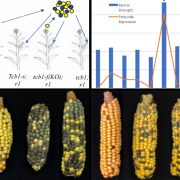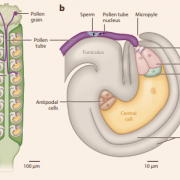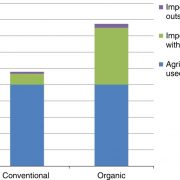Antibody array-based proteome approach reveals proteins involved in grape seed development
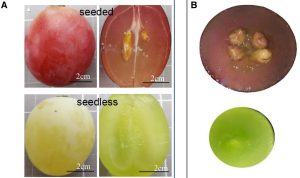 Grape (Vitis vinifera) is a globally cultivated fruit for fresh or processed consumption, and seedless grapes are highly preferred for consumer convenience. In seedless grapes, fertilization occurs but the embryo subsequently aborts, although the molecular basis for this abortion is not understood. Zhang et al. used a special antibody array-based proteome approach to identify differences between seeded and seedless grapes. Validation and mass spectrometry tests confirmed the 71 differentially-regulated proteins. A protein-protein interaction network showed changes in pathways related to carbon metabolism and glycolysis. When the authors overexpressed a protein called VvDUF642 in tomato plants, fewer seeds were produced. VvDUF642 works with another protein, VvPAE, which also reduces seed production when overexpressed. Thus, this study identified proteins that are involved in seed formation and these insights could help breed seedless grapes and other fruits in the future. (Summary by Yueh Cho @YuehCho1984) Plant Physiol. 10.1093/plphys/kiad682
Grape (Vitis vinifera) is a globally cultivated fruit for fresh or processed consumption, and seedless grapes are highly preferred for consumer convenience. In seedless grapes, fertilization occurs but the embryo subsequently aborts, although the molecular basis for this abortion is not understood. Zhang et al. used a special antibody array-based proteome approach to identify differences between seeded and seedless grapes. Validation and mass spectrometry tests confirmed the 71 differentially-regulated proteins. A protein-protein interaction network showed changes in pathways related to carbon metabolism and glycolysis. When the authors overexpressed a protein called VvDUF642 in tomato plants, fewer seeds were produced. VvDUF642 works with another protein, VvPAE, which also reduces seed production when overexpressed. Thus, this study identified proteins that are involved in seed formation and these insights could help breed seedless grapes and other fruits in the future. (Summary by Yueh Cho @YuehCho1984) Plant Physiol. 10.1093/plphys/kiad682


